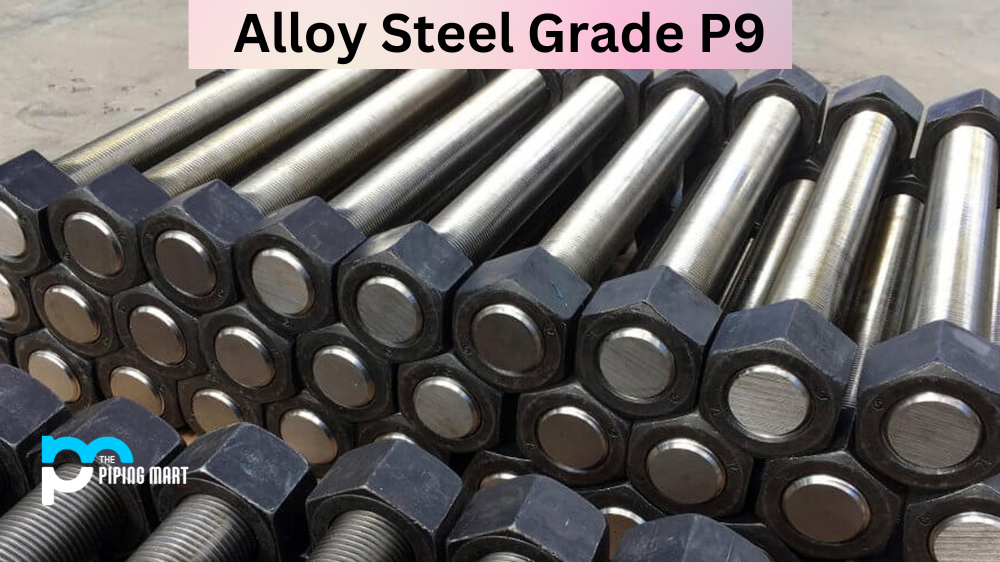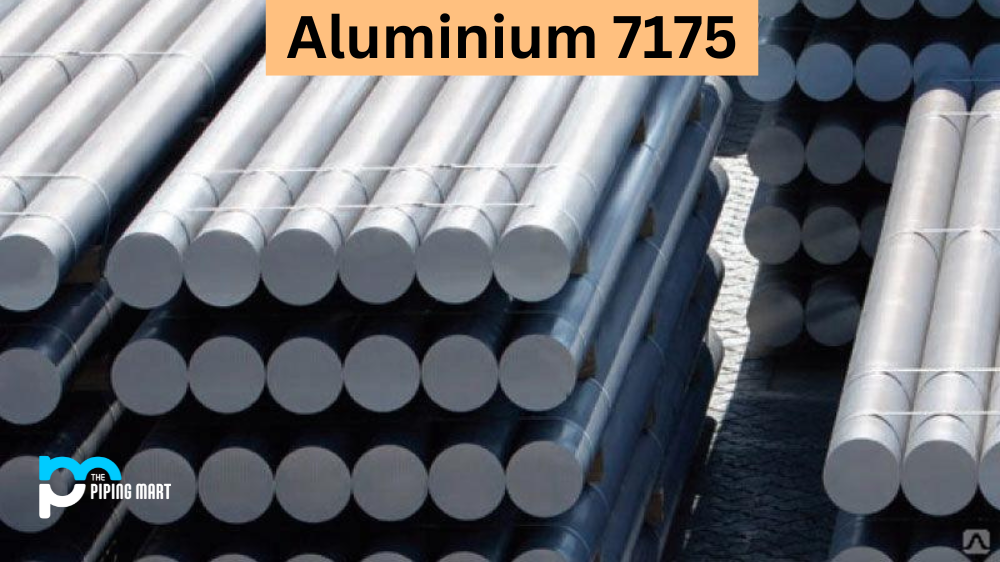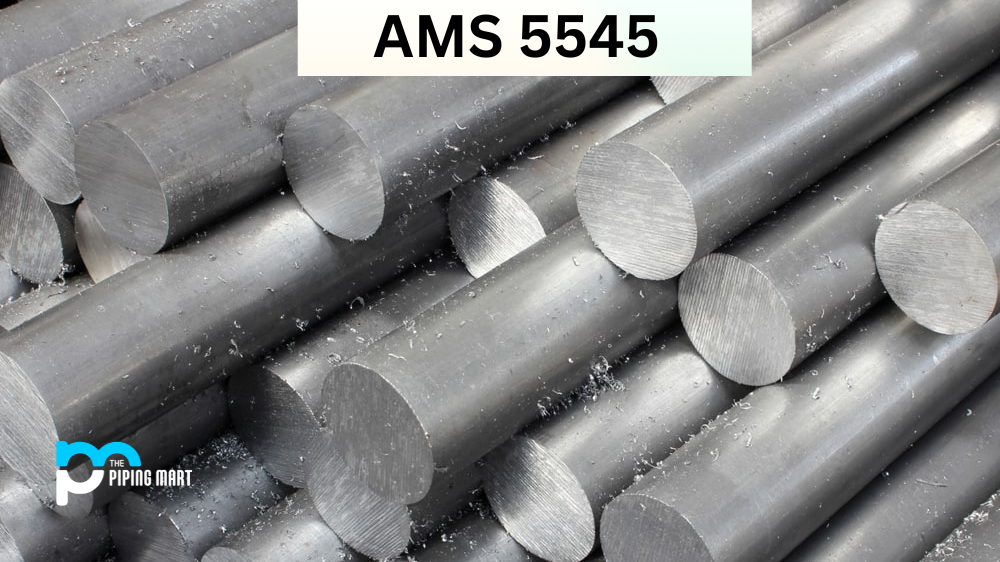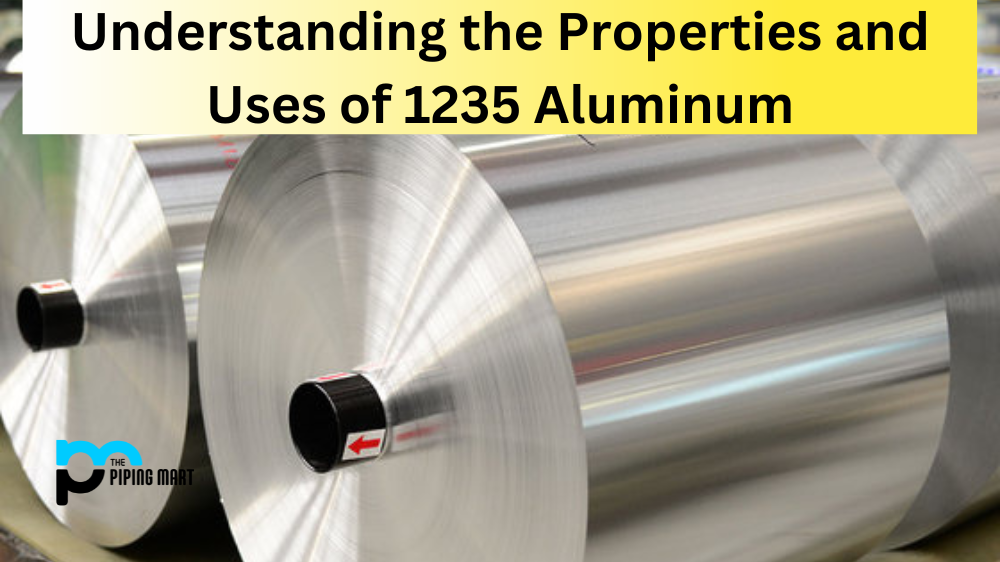Alloy steel grade P9 is a versatile alloy with a wide range of applications. It has been designed to provide excellent mechanical properties and good corrosion resistance in a wide range of temperatures. In this article, we will discuss the chemical composition, physical properties, uses, and machining of Alloy Steel Grade P9.
Alloy Steel Grade P9 Chemical Composition
The chemical composition of Alloy Steel Grade P9 includes 9% chromium, 0.35% molybdenum, 0.30% silicon, and 0.15-0.25% carbon for improved strength at elevated temperatures up to 600°F (316°C). The addition of molybdenum improves corrosion resistance compared to other chromium-manganese alloys due to its higher pitting resistance index (PRI) value. With its striking silvery color and many useful properties, it’s no wonder cu-ni alloys (copper-nickel alloys) have become increasingly popular in a variety of industries and applications. Known by the general name cupronickel, cu-ni alloys generally consist of at least 60% copper combined with nickel and sometimes other elements as well. They are often used as electrical wiring due to their resistance against corrosion, low conducting losses in power switchgear, thermowells for medical applications such as prosthetics, musical instrument parts like nickel silver strings, rolls for printing presses, boat propellers, and even plating coins or jewelry. Cupronickel contains iron in much lower concentrations than iron alloys, making them durable and long-lasting.
| Carbon | Manganese | Phosphorus | Sulfur | Silicon | Chromium | Molybdenum |
| 0.015 Maximum | 0.30 To 0.60 | 0.025 Maximum | 0.025 Maximum | 0.50 Maximum | 4.00 To 6.00 | 0.45 To 0.65 |
Alloy Steel Grade P9 Chemical Properties
Alloy Steel Grade P9 is an iron-based alloy that incorporates chromium, molybdenum, and tungsten. Its combination of elements allows it to achieve exceptional ductility and tensile strength while managing corrosion. This makes Alloy Steel Grade P9 ideal for applications in chemical processing, power generation, petrochemical industries and automotive engineering. The elimination of internal stresses also makes it suitable for construction components such as steam turbines due to its ability to handle high temperatures without buckling or cracking. By maximizing both yield and tensile strengths, Alloy Steel Grade P9 grants engineers the flexibility to design products that perfectly fit a given industry’s performance requirements.
Alloy Steel Grade P9 Physical Properties
Alloy steel grade P9 has a high tensile strength (830MPa minimum) with good impact toughness at room temperature as well as at -50°F (-46°C). It also has good creep resistance up to 600°F (316°C). The alloy has a low thermal expansion rate, which makes it ideal for use in temperature-sensitive applications such as valves and control systems components.
Alloy Steel Grade P9 Mechanical Properties
Alloy Steel Grade P9 is renowned for its high mechanical strength and excellent corrosion resistance. Its optimal combination of carbon, manganese, silicon and molybdenum allows for enhanced toughness and strength at high temperatures, making it an ideal material for those looking to establish superior structural integrity in their projects. The the material can also be machined to produce parts that exhibit superior fatigue durability and wear resistance. Whether your application demands shock-absorbing properties or exceptional formability, Alloy Steel Grade P9 delivers both with unparalleled accuracy while maintaining ultimate heating efficiency.
| Tensile Strength | Yield Strength | Elongation |
| 415 Minimum | 205 Minimum | 30 Minimum |
Alloy Steel Grade P9 Equivalent
| ASTM | ASME | JIS G 3458 | UNS | BS | DIN | ISO |
|---|---|---|---|---|---|---|
| A335 P9 | SA335 P9 | STPA 26 | S50400 | 3604 P1 629-470 | 2604 II TS38 |
Alloy Steel Grade P9 Uses
- Alloy steel grade P9 is a chromium-molybdenum alloy that is used in a variety of high-temperature applications.
- P9 alloy steel is often used in power plants and chemical plants, as it can withstand high temperatures and has good corrosion resistance.
- P9 alloy steel is also used in the construction of industrial furnaces.
- P9 alloy steel can be used for a variety of other high-temperature applications, such as in the aerospace industry.
- P9 alloy steel is also sometimes used in the medical field, as it is biocompatible and can be used in implants and other medical devices.
- P9 alloy steel is also used in the food processing industry, as it is non-toxic and has good corrosion resistance.
- P9 alloy steel can also be used in the manufacture of certain types of glass.
- P9 alloy steel is also sometimes used in the production of coins and medals.
- P9 alloy steel can also be used for a variety of other applications, such as in the production of electrical components.
Alloy steel grade P9 is used in a variety of applications such as gas turbine blades, exhaust manifolds, fasteners, piping components, and steam turbines due to its excellent heat treatment properties, which allow it to withstand high temperatures without compromising its strength or corrosion resistance.
Corrosion Resistance
It also exhibits excellent corrosion resistance even when exposed to harsh environments such as seawater or dry chlorine atmospheres.
Heat Treatment
Alloy steel grade P9 can be subjected to a variety of heat treatments, including annealing or tempering processes that increase its hardness while maintaining its ductility or strength depending on the desired application’s requirements. It can also be used in cryogenic applications since it retains its mechanical properties at subzero temperatures (−320 °F or −196 °C).
Welding
Alloy Steel Grade P9 welding is a great choice for many industries. It has the highest tensile strength in its class and is highly resistant to corrosion and wear. The low carbon content of the material makes it easy to weld with minimal heat input required, which is especially key for large production runs. Additionally, its excellent machinability allows for the creation of complex shapes from cast forms. Grade P9 welds are also weldable with most standard stick and stainless-steel fluxes, making them incredibly versatile for nearly any situation. With its high strength and versatility, Alloy Steel Grade P9 welding offers real value for today’s manufacturing needs.
Heat Resistance
Alloy Steel Grade P9 has been utilized in the engineering industry for decades due to its superior heat resistance properties. It is an ideal material for high-temperature applications such as heavy-duty valves and components used in large steam systems. Its combination of chromium and molybdenum gives it the utmost strength while still allowing versatile formability. Its ability to withstand extreme temperatures without slipping or becoming brittle makes it one of the top choices for engineering projects – making sure that every project runs safely and efficiently.
Machining
When machined using traditional methods such as turning or milling, tool life may be reduced due to the material’s hardness, but this can be remedied by using coated tools made from tungsten carbide or high-speed steel tools with coolant applied during machining operations so that the cutting edges don’t heat up too quickly and become damaged over time.
Conclusion
All in all, alloy steel grade p6 is a versatile material with excellent mechanical, physical, corrosion-resistant, heat-resistant, machining, and welding properties making it an ideal choice for many different types of engineering applications. Its ability to withstand extreme conditions makes it suitable for use in industries requiring parts that are able to perform under difficult working conditions. Additionally, its low thermal expansion rate makes it an attractive option for various valve and control system components where accurate tolerances must be maintained even under fluctuating temperatures. Finally, because alloy steel grade p6 is relatively easy to machine using traditional methods such as turning or milling, coupled with the fact that it can be welded without causing any stress cracking, it makes it an ideal choice for fabricators needing parts with complex shapes or geometries. Furthermore, because this material offers superior performance when exposed to harsh environments like seawater or dry chlorine atmospheres means that alloy steel grade p6 is an ideal choice for numerous marine engineering projects.

Meet Bhavesh, a seasoned blogger with a wealth of knowledge and experience. From metal products manufacturing to retail, Bhavesh has a diverse background in various industries and is dedicated to sharing his insights and expertise with readers.




